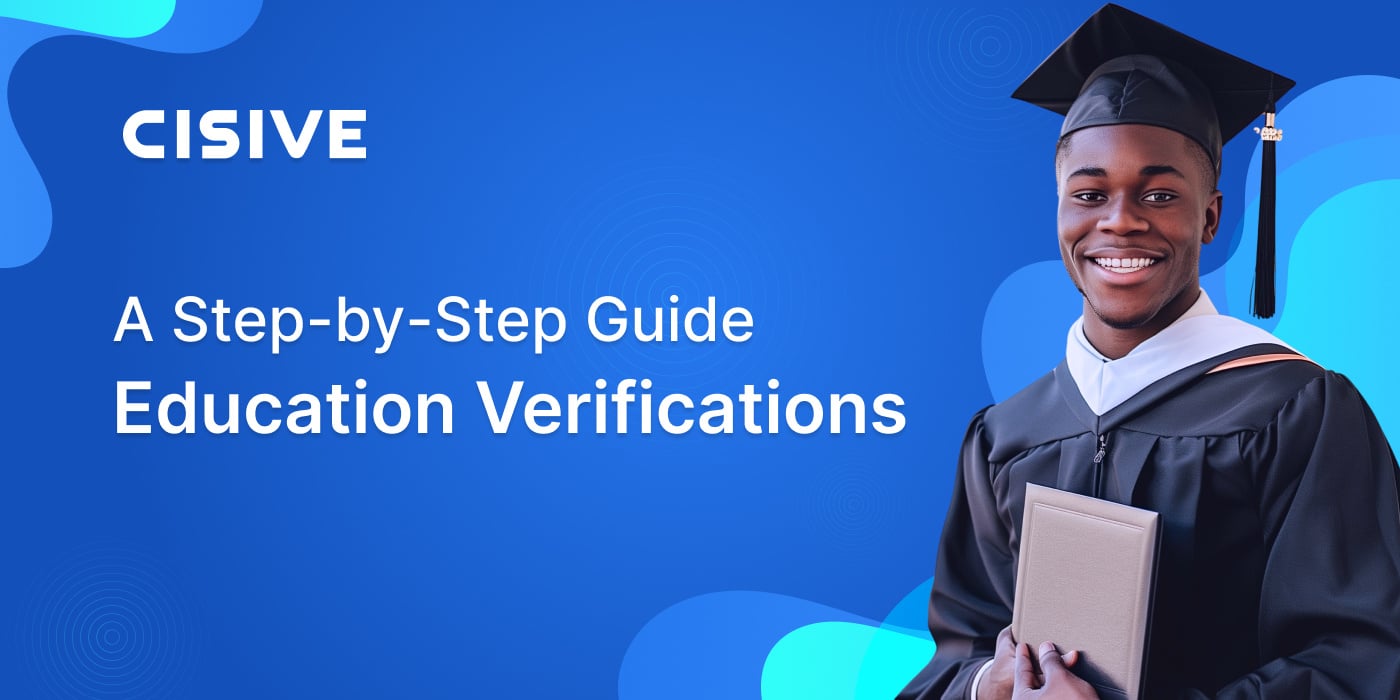

Traditionally, the background check process occurs in tandem with skills assessments and final...

Hiring an unqualified or underqualified person can cost your company a lot of money and damage its reputation. Without the right skills or technical abilities, bad hires can underperform for clients and damage longstanding relationships. In certain roles or industries, they could even cause physical or financial harm to others.
Knowing a candidate’s educational background can help reduce such risks. But, many job applicants embellish their resumes and education histories. Others have degrees from diploma mills that are not even worth the paper they’re printed on.
Verifying an applicant’s education history gives you confidence in your next hire. Performing an education verification background check is fairly straightforward when done properly, but there are plenty of pitfalls to be aware of. We’ll discuss all of that in this comprehensive guide.
Key TakeawaysHere are the key things you need to know about pre-employment education screening:
|
Table of Contents
Education verification screening is a process that confirms the information a job applicant provides about their education and qualifications. This includes the schools they’ve attended, the degrees they received, or the certifications they’ve earned. It can also be called an education background check or degree verification.
Employers use education screening to ensure that the applicants they hire actually meet the educational standards required for the job. It helps weed out applicants who may be embellishing or outright lying about their educational credentials.
In the end, like all types of background screenings, the education verification screening is designed to help employers make informed hiring decisions.

Educational background verifications should be a standard part of hiring for most roles beyond entry level. However, sometimes employers skip it because they think it’s a complicated process. Certainly, it can be, particularly if you try the DIY route.
But using a third-party partner like Cisive, with our powerful technology and purpose-built tools, can make the verification process quick and efficient. Let’s discuss some of the basic parts of the process.
To verify education, you’ll need to provide the applicant's full name at the time they were registered at the school or program.
For this reason, you may want to ensure that your application asks applicants to provide maiden names or other names they’ve used in the past. You’ll also need the applicant’s date of birth and, in some cases, their Social Security number.
Remember, whether it’s a new hire or an existing employee, you must receive the applicant’s written consent to do a background check, per the Fair Credit Reporting Act (FCRA).
Depending on the role you’re hiring for, you may want to ask candidates to provide transcripts and copies of their diploma(s).
This isn’t something you need to do for every role, but it can be useful if you believe it would be helpful to see what specific classes the candidate took. You might also consider asking for transcripts if the candidate completed a self-directed degree where they were able to design their own major.
Most employers don’t feel the need to dig deeply into candidates’ specific classes, particularly at the undergraduate level. But, if you’re hiring for a position that requires a specific advanced degree or specific knowledge of a topic, a transcript can be useful.
If you haven’t heard of the school the candidate listed, research it online. Make sure the school is accredited. Unfortunately, there are many “fake” schools, often called diploma mills, that give people degrees in exchange for money. Diploma mills usually require little to no academic study, so the students don’t actually learn.
Such schools also claim to be accredited, but they use shady agencies to get their accreditation. Always look at the U.S. Department of Education website to verify that a school is legitimate.
If you conduct your education background checks in-house, you could use the National Student Clearinghouse, which is an online portal, to verify enrollment dates. Using the portal requires you to register and demonstrate a valid reason for requesting someone’s information.
If the Clearinghouse doesn’t have a file on your applicant, then you will need to contact the schools themselves to verify attendance dates and graduation dates.
If you attempt the DIY route, you’ll need to contact all the institutions listed on the candidate’s resume and request a transcript or verification of their degree. This can be tedious and time-consuming. It may also require the candidate to step in and complete a form giving the institution permission to release their records.
All of this can be difficult, particularly if a candidate attended multiple schools. You’ll also need to understand the Family Educational Rights and Privacy Act, which may limit access to student records in certain cases.
Using a proven background check provider like Cisive reduces the burden on your staff and ensures that you remain legally compliant when conducting education verifications.
Roles in industries such as education, finance, healthcare, engineering, and law often require employees to have specific educational backgrounds, degrees, and licenses. The same is true in many other fields, from fitness to cosmetology.
Hiring someone who lacks the right education credentials can have harmful effects on your organization and even expose it to legal liability. We’ll discuss the importance of education background checks in the next section.

Education background checks can help ensure that you’re hiring a candidate with the right credentials. Doing this can potentially reduce legal liabilities and satisfy regulatory requirements. Let’s expand on some of the reasons you should consider this type of pre-employment screening.
If you hire an unqualified person who goes on to cause harm to a customer or other employee, your company could face a lawsuit for negligent hiring.
The most obvious example is a healthcare company hiring a doctor, only to later find out, after multiple incidents, that they never went to medical school. But this can happen in many industries, with varying degrees of harm.
This can be very costly both financially and reputationally. Education screening is an easy way to mitigate this risk.
Unfortunately, many candidates fabricate qualifications to make themselves more attractive for roles. Maybe they list recent certifications that they never earned, or maybe they list a degree from a more prestigious school than they actually attended.
Education verification helps you verify that the person actually earned the degrees and related credentials that are listed on their resume.
Hiring unqualified or underqualified people can damage your company’s reputation both externally and internally.
For example, a bad hire could do something that brings negative publicity that turns customers away. And internally, the morale of your employees can be greatly harmed when they realize the person you hired isn’t fit for the job, thus making other workers’ jobs harder.
Doing a pre-employment education screening allows you to be more confident that the person you hire will meet the standards you and the rest of your employees and customers expect.
Diploma mills are still a major problem. These bogus institutions sell degrees and other credentials without actually requiring any coursework. Sometimes it’s as easy as placing an order and receiving a “degree” from a college that doesn’t exist. The healthcare industry is one example of an industry where diploma mills are thriving.
When you do DIY background checks where you call a supposed college to verify a degree, the diploma mill might use an answering service that falsely verifies the degree on your candidate’s resume.
Using a verification service like Cisive, on the other hand, confirms whether an institution truly exists and whether it has genuine accreditation from a recognized accrediting body.
Various laws at the federal, state, and/or local levels may require that you check education history for certain jobs. For example, education checks may be mandatory for roles in highly regulated fields like healthcare and finance, where employees may have access to sensitive information.
There are two main ways an employer can conduct education background checks. One is to do it in-house (DIY method) and the other is to use a third-party service.
Employers may be able to verify candidates’ claims on their own. Typically, employers do this when it’s a simple check and they don’t want to spend the money on a partner service. It can be easy to DIY it when you have low turnover and don’t hire new people frequently, or when you’re in an industry that doesn’t have regulations requiring it. However, it is a lengthy process that can be a drain on resources.
DIY verification means you’ll need to contact all educational institutions the candidate listed on their resume. You may need to call the schools or find out how to submit an online request with the registrar’s office. As mentioned above, however, some diploma mills have answering services that claim to verify an applicant’s fake degree.
In addition to the risk of being lied to by a diploma mill, there’s also the issue of staff priorities. In other words, do you really want your staff spending their valuable time calling schools or researching to ensure that a school is actually accredited? There are most likely more valuable things your staff could be doing.
Using a third-party background check provider is the easiest way to perform education verifications. Providers like Cisive have purpose-built technology that makes the process easy and fast. Our tools can verify attendance dates, degrees earned, accreditation status, and more.
Our system can take days or even weeks of manual DIY work and reduce it to a matter of a few hours. Overall, using a third-party service can drastically cut your time-to-hire while simultaneously yielding more accurate and thorough results.
Cisive’s education verification rate is nearly 99%, making us the most accurate in the industry. We offer a robust catalog of educational institution contact preferences. This means we know how to engage with institutions in their preferred channel, such as email, phone, and more.
Our powerful screening technology is backed by a standout team of professionals dedicated to your success. We have efficient processes that make turnaround times fast. If you ever have questions or need help, a Cisive team member is never far away.
Don’t risk hiring the wrong person. Vet each applicant’s background, including running an education verification background check, to ensure that your investment in hiring pays off. Use Cisive’s proven platform to streamline the hiring process and protect your company from liability. Reach out to one of our experts to discuss all your background check needs.
Author: Jenni Gallaway
Bio: Content Marketing Manager at Cisive. 8 years of experience in the background screening industry.
Let's Connect on LinkedIn
Traditionally, the background check process occurs in tandem with skills assessments and final...

A year of unprecedented challenges resulting from the global pandemic has dramatically shifted how...

Recruiting and retaining talent is one of healthcare HR’s biggest challenges, especially with...